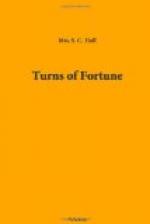As the evening closed in, and the astonishment and feelings of their first meeting subsided, Sarah Bond and Mr. Goulding conversed apart, and then, indeed, she listened with a brimming heart and brimming eyes. He told of his young friend’s deep attachment to Mabel; how he had prevailed upon him to pause before he declared it; to observe how she endured her changed fortune; and to avoid engaging her affections until he had a prospect of placing her beyond the reach of the most harrowing of all poverties, that which keeps up an appearance above its means. “Her cheerfulness, her industry, her goodness, have all been noted,” he continued. “She has proved herself capable of accommodating herself to her circumstances; the most difficult of all things to a young girl enervated by luxury and indulgence. And if my friend can establish an interest in her affections, he has no higher views of earthly happiness, and I think he ought to have no other. You will, I am sure, forgive me for having counselled the trial. If deep adversity had followed your exertions—if you had failed instead of succeeded—I should have been at hand to succour and to aid.”
Sarah Bond had never forgotten the emotion of Mabel, caused by the mention of the curate’s name when they quitted their old neighbourhood, and the very reserve Mabel showed proved to Sarah’s searching and clear judgment, that the feeling was unchanged. Truly in that hour was her chastened heart joyful and grateful. “Mabel must wait,” she said, “until the prospect of advancement became a reality; for it would be an ill return of disinterested love for a penniless orphan to become a burden instead of a blessing. Mabel would grow more worthy every day; they were doing well; ay, he might look round the white-washed walls and smile, but they were prosperous, healthful, happy, and respected; and if she could only live to see the odium cast upon her father’s memory removed, she would not exchange her present poverty for her past pride.” She frequently afterwards thought of the clergyman’s rejoinder—“That riches, like mercy, were as blessed to the giver as to the receiver, and that they only created evil when hoarded, or bestowed by a heedless hand.”




